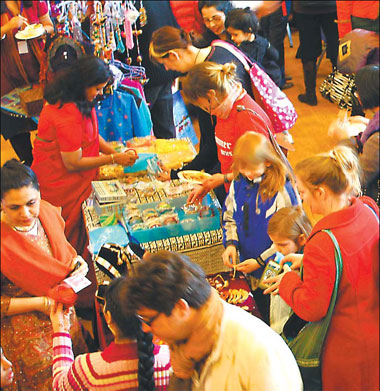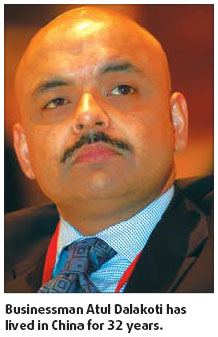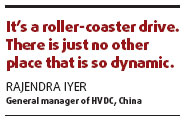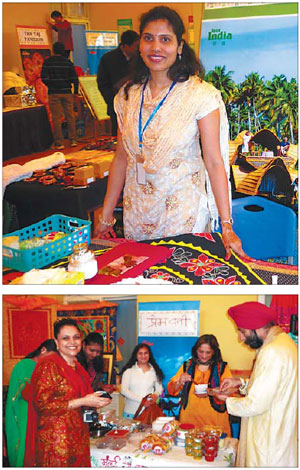Sugar and spice

|
The Indian Community of Beijing organized the first-ever Indian Bazaar on Feb 14 that drew an enthusiastic response from expats and locals alike. Courtesy of British School of Beijing |
A starry-eyed Indian teenager hops on a plane for the first time, flies over the Himalayas and lands in Beijing. The 13-year-old accompanies his parents from New Delhi on their second China visit to continue their pioneering work in the Hindi translations of Chinese classics and Chairman Mao's books. His life will never be the same.
Atul Dalakoti, 45, is the executive director of the Federation of the Indian Chamber of Commerce and Industry and advisor to one of India's most-recognized corporate names, the Anil Ambani Group.
Today, you can get on a plane from Kunming, in Southwest China, to Calcutta in India, and you will reach in the same time that it takes to get from Beijing to Shanghai - about two hours.

The two neighboring countries have always been geographically close but it's only now that both the Indian and Chinese people feel this proximity as more Indians settle in the Middle Kingdom. There are an estimated 25,000 Indians living on the mainland and Hong Kong has about 12,000 persons of Indian origin and a further 23,000 people with Indian passports.
These numbers continue to grow, fuelled by the indisputable fact that the two countries, which are home to nearly a fourth of humanity and contribute 40 percent of world GDP, are at the forefront of what is increasingly shaping up to be Asia's century.
The story of this growing presence goes back to China's reform and opening up in the early 1980s and rises dramatically in the 1990s.
Dalakoti says the late 1970s was a time of great upheavals in China (with the end of the "cultural revolution") and India (the first post-independence change in power at the center).
It was also a time of thaw in a bilateral relationship that was frozen between 1962 and 1977.
In these early days of change, most Indians who came to China were scholars.
Trade stood at a paltry $260 million. In 1990, one such scholar, Sagnik Roy, came here as part of an exchange program.
In 1996, he married a Chinese woman and in 2000, bought a stake in the Yongtong Group, becoming perhaps the most successful Indian businessman in China.
"Except for some embassy families, there was no Indian community here when I came," he says.
In the same 1990s, a young hotel management graduate, Mehernosh Pastakia, traveled from Mumbai to China and married a local woman and establish a restaurant that has become a byword for authentic Indian cuisine.

While language may be a non-issue for people like Roy and Pastakia, it does pose a challenge for the post-2000 Indian expat crowd.
But Vikram Singh, who is China head for Johnson Mathey, says learning Chinese can be exhilarating.
JM is a leader in the clean conversion of coal to chemicals and China is, obviously, a big market.
Singh, a chemical engineer who moved here from New Delhi, finds China "very expat-friendly".
He may not wrap his tongue around the correct tones, but he loves the tongue-numbing cuisine of Sichuan and Hunan.
Unsurprisingly, he works off all that oily food over the weekends with loads of tennis and badminton matches.
Echoing similar sentiments, the vice-president, sales and marketing for Volvo, Mansoor Ahmed, says he is impressed by the "strong work ethic and discipline" he sees here.
He cites the absolute compliance with the "leave a lane free" rule introduced during the Olympics.
"I really wonder if this could have worked anywhere else," he muses.
Ahmed came to Beijing in 2007 when the headquarters for Volvo's Asian operations was established in Beijing. "China is the largest market for trucks in the world, presenting a great opportunity for personal growth," he says.
As a practicing Muslim, Ahmed and his family go to the 1,000-year-old mosque in Niujie and also celebrate all important Muslim festivals.
Rajendra Iyer, just 38, and general manager of HVDC, China, has always worked for ABB, Sweden, a global leader in power and automation technologies.
He joined the Swedish MNC a year after graduating as an electronics engineer in 1994 and moved to Sweden in 2001.
A year later, he was in China helping to manage Three Gorges project and stayed for three years till it became operational.
Last year, considering he was working in China more often than living in Sweden, he set up base here and is now tasked with developing the HVDC transmission business in China.
What's life like here for someone clearly in the fast lane of professional growth. "It's a roller-coaster drive," says Raj adding, "There is just no other place that is so dynamic."
The spouses, more often than not are as, or more qualified than, the men. Many hold professional degrees, such as Yogita Khatri, a mechanical engineer with an MBA in marketing.
Giving up a high profile job as senior marketing manager for Spicers India, she followed husband Anil Khatri, global business director, storage and transportation solutions for Honeywell.
Any regrets? "Nah, I love being in China," she says.
With bilateral trade now being quoted in hundreds of billions of dollars, a lot more Indians are going to be saying that as they tuck into spicy tofu in the many Sichuan restaurants lining the streets of Beijing, Guangzhou and Shanghai!
(China Daily 03/02/2009 page10)















